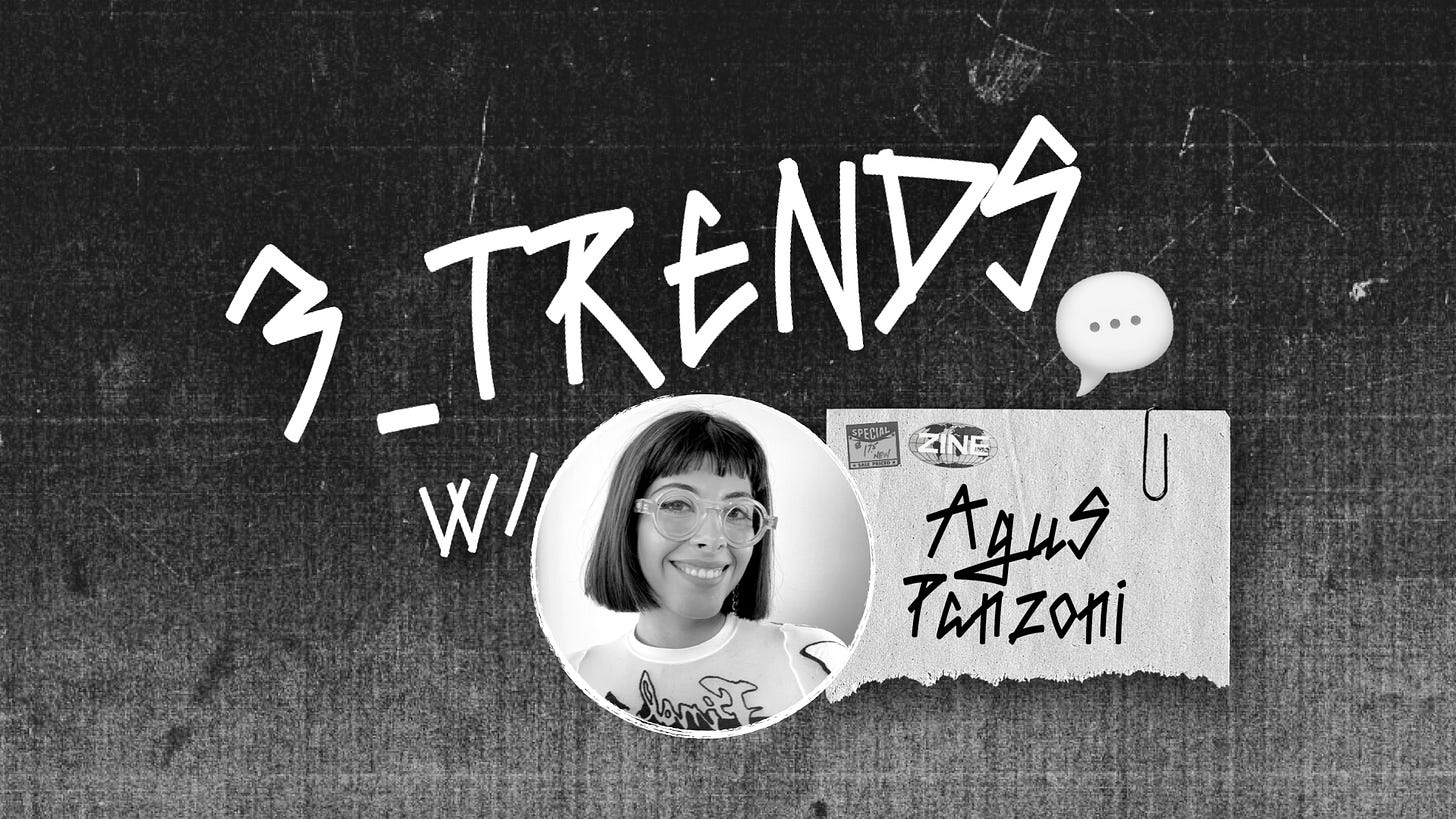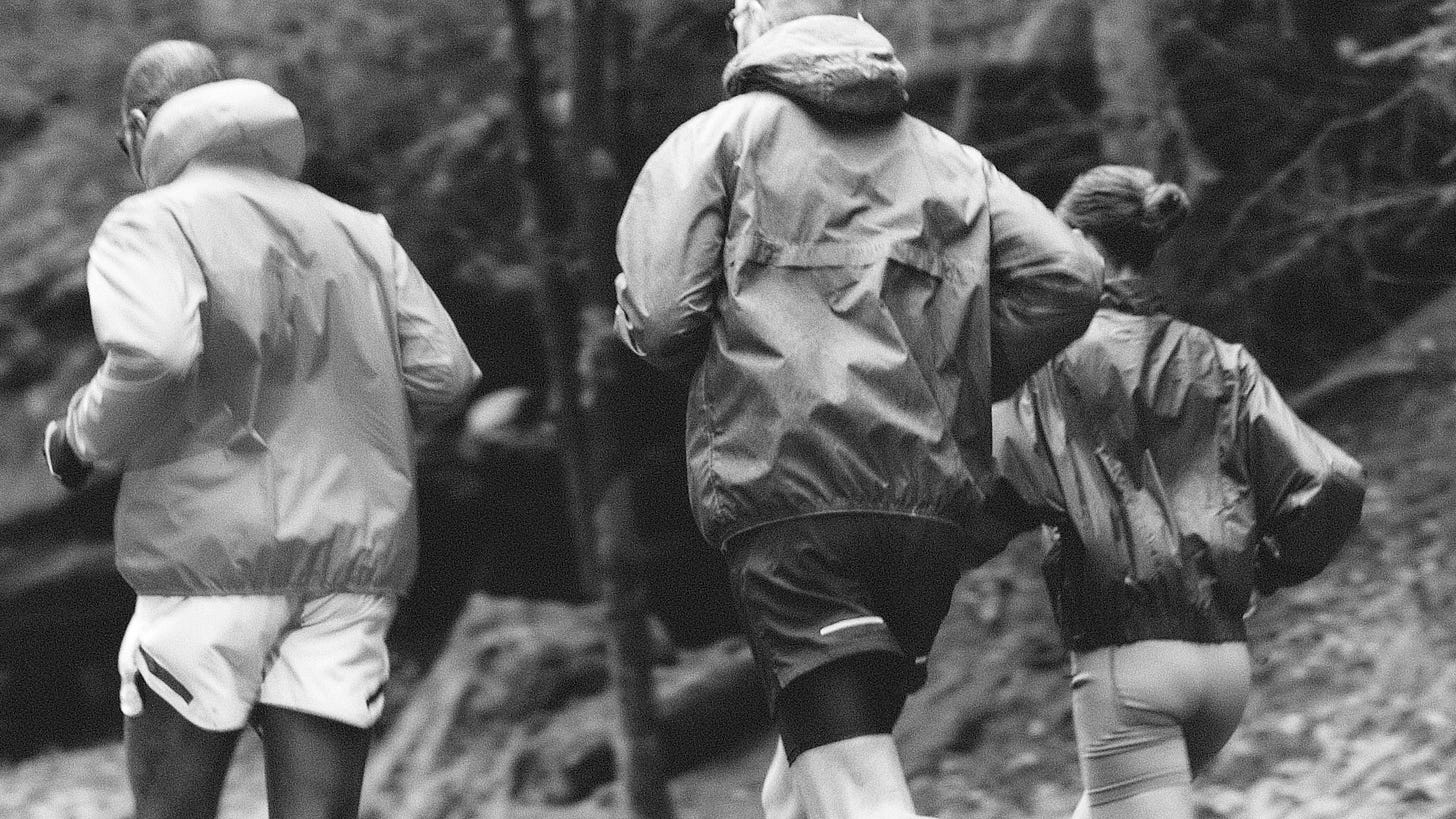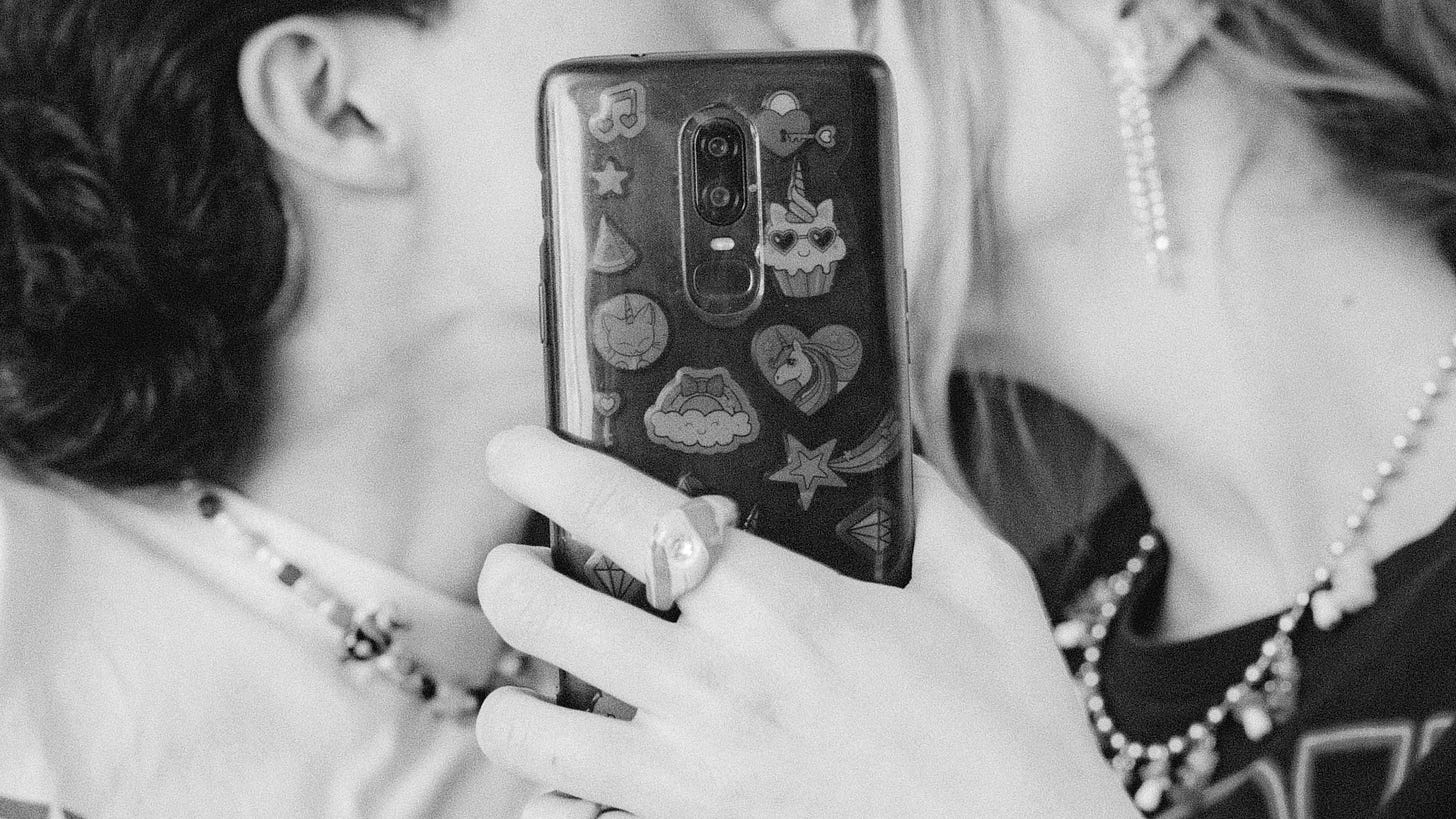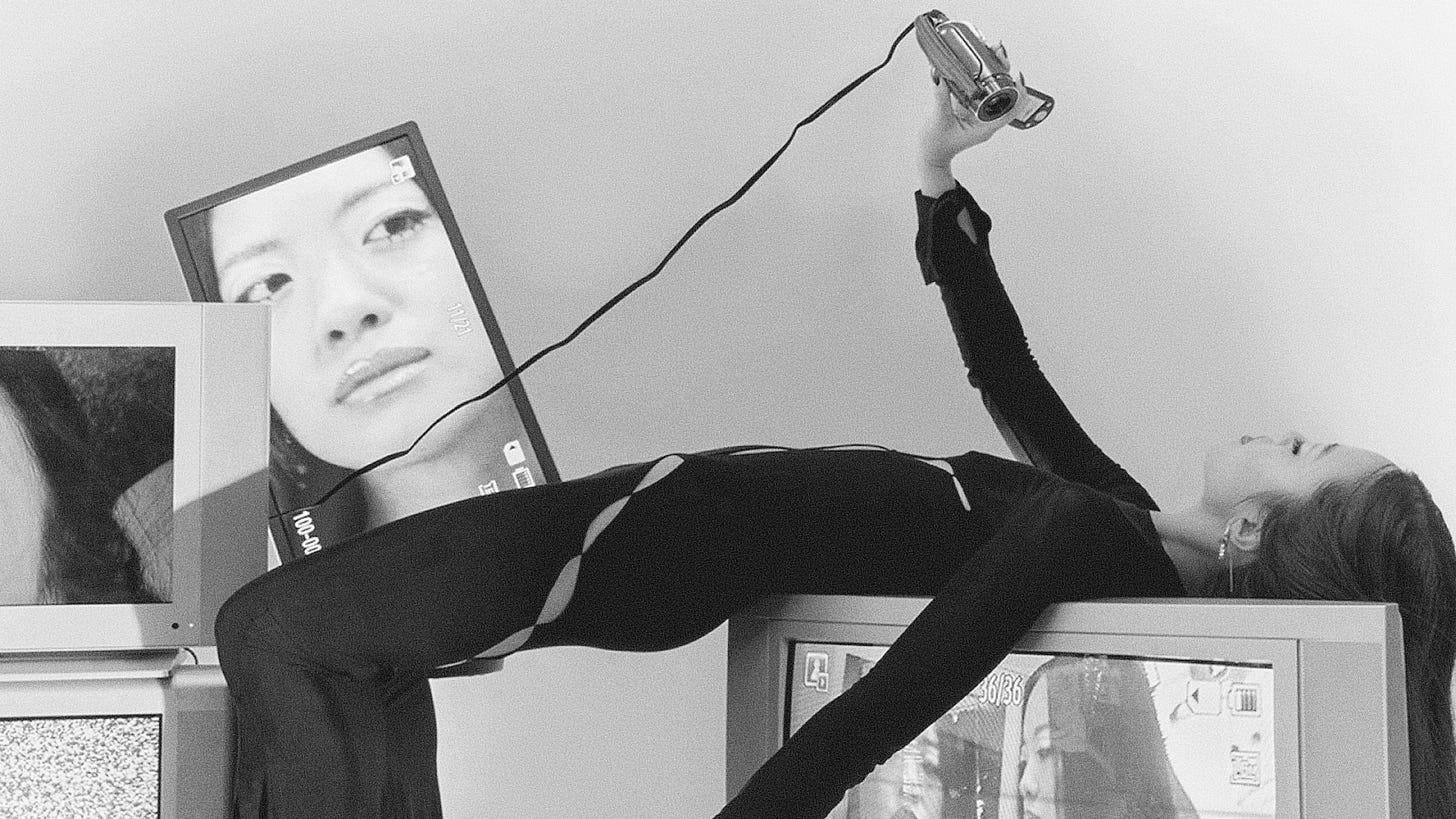3_TRENDS_Vol.24: Agus Panzoni: IRL Escapism, Meta Cringe + Screen Angst
Vol.24
3_TRENDS is an interview series with the world's leading cultural researchers and thinkers, sharing their favorite overlooked trends.
Agus Panzoni (AP) is the Head of Trends at DTS, a global subscription platform that provides digital assets to a community of +550K brands and creatives. She uncovers cultural narratives behind visual trends on DTS' socials and their newsletter. She also runs @thealgorythm and has collaborated with brands such as Depop, TED, Instagram, Lyst, and most recently Klarna.
MK: Agus, what’s on your mind?
IRL Escapism
AP: In just three years, escapism has taken us everywhere, from the historical to the fantastical to the otherworldly, influencing aesthetics in fashion, sounds in music, media, visual elements, and more. ‘Escape’ has been integrated into our products, services, and experiences.
However, as we continue to dissociate from our present reality, the loneliness epidemic is worsening. In fact, the Surgeon General just labelled loneliness and isolation an epidemic.
AI is considerably exacerbating this dilemma with chatbots aiming to substitute human-to-human interaction, and AI-generated content is creating a wider divide between what is “real” and not. Further division is a result.
With this, escaping to in-person experiences are gaining immense value in a world saturated with digital replicas.
IRL Escapism reminds us of the awe-striking tangible reality and prompts us to create a lifestyle focused on spending time and resources on the people and environment in our physical proximity.
I’m excited to see how organizations will embrace this shift.
The de-growth apparel brand Early Majority has created a membership model that provides their audience with tools to disconnect and "lean out.” Meanwhile, the emerging group chat platform Geneva is being dubbed "The online place to find your offline people," offering tools to connect people with similar interests who live in close proximity offline.
MK: Call it “Offline as ingredient.”
Is it new? Not necessarily, but the value of “escape” is changing.
In future when fact and fiction blur because “truth” is devised effortlessly (think: deep fakes + cloned audio + sock puppet account armies seeding that fictitious media), “online” becomes a dirty playpen. Will this be a norm? I don’t know, but it’s certainly a plausible scenario given our history and what’s already around us.
A reaction is “IRL Escapism.”
(I have slight pause with the phrase “IRL” because fake media is very much real and still exists in this reality... but we get what what we’re talking about when we say “IRL”)
The “offline” becomes our authenticator.
I’m quite bullish that live, “IRL” activations will become a reliably, trustworthy means of credibility in our futures.
“Seeing is believing” becomes “Seeing with my own eyes, in-person is believing.”
When the digital is accessible and cheapened, the physical and synchronous become a luxury.
Timely, Taylor Swift’s Eras tour supports this hypothesis — one of the highest grossing tours of all time.
We once saw on-demand as a luxury.
Soon physically here and now will be a luxury. Premium friction.
Meta Cringe
Our longstanding fascination with cringe is suitable for a society which obsesses over followers, likes, and views. In a world driven by social currency, observing individuals who deviate from "socially accepted" norms serves as both instructive cautionary tales and guilty-pleasure, schadenfreudian entertainment.
In recent years, the energy surrounding cringe content has noticeably increased. Reddit has seen the swell of cringe communities like r/cringe and r/cringepics, while on TikTok, #cringe has amassed +43B views and #cringetok +2B views. (See also the combo of the two: r/CringeTok.)
As time has passed, our attitudes towards cringe have revealed more collective acceptance.
Years ago, the popularity of sincerely cringe videos had comedy creators imitating cringe-inducing attitudes through an ironic lens. Think: skits.
More recently, the decline of flex culture ushered in self-aware creators sharing their failures to appear more relatable and authentic to their audience. Think: honesty.
Currently, the cringe pipeline has led us to Meta (ironic) Cringe — a stage characterized by radical self-acceptance and the subversion of societal expectations. Think: acknowledging the cringe, but just not caring.
This year, pasta puffers have become the must-have jacket of the winter, Comic Sans (the font) has risen as a trending typeface, dweeb couture dominated fashion week, Shrek raves are bringing swamp energy to nightclubs around the world, and media characters such as Nathan Fielder, Jennifer Coolidge and Tim Robinson are permitting us to all embrace our cringe.
MK: Who wants to burn energy worrying about what other might think when the sky is orange.
Meticulous, Millennial personal brands were an artifact of the Obama era. We’re in a post-Trump shitpost moment.
You can succeed become the most powerful person in the world by bullshitting and “not caring.”
Off course we’re basking in cringe.
But here’s the tension:
As Rachel Greenspan explained in her 3_TRENDS volume on Fake Authenticity:
“The paradoxical truth is that there’s nothing casual about intentionally telegraphing casualness for the sake of looking cool.”
Wearing a Pasta Puffer jacket to telegraph you “don’t care” is in fact an act, (implicitly) signally you do care. Otherwise you wouldn’t have sought out and purchased a purposefully cringy pasta jacket.
BeReal’s death is a clue about our moment: no one wants to pretend that they don’t care (because we do in fact care — we’re humans). Yet simultaneously, no one has the energy to care-care either.
It’s a struggle... and perfect transition to:
Screen Angst
AP: An increasing body of research is solidifying the tie between cell phone usage and the deterioration of mental well-being.
This connection is especially concerning for Gen Z, who, on average, devote a staggering 7-11 hours on their phone a day.
As they immerse themselves in the digital realm, the pursuit of authenticity and truth became intertwined with the pressures of creating compelling online identities.
As a response, there has been a rise in the popularity of realist and “authentic” content over the past few years, including forms like shitposting, photo dumps, etc.
However, we now find ourselves confronting the futility of striving to encapsulate the “true essence” of life.
Screen Angst represents itself through content which portrays our longing and seeming inability to escape from the digital world.
We’re trapped inside.
Across social, it’s led to creative movements like corecore, expressing exhaustion with the digital realm and context collapse... all while existing within it.
Meanwhile, in the editorial world, models are portrayed stuck in screens, and in fashion, brands are showcasing models on runways clutching phones, symbolizing our increasing disconnection from the tangible world.
MK: There’s wanting, and wanting to want. And in this case, I think many genuinely want out — however can’t do so. The dependency is permanent. Opting out is a luxury.
We wake and there’s the reflex to check the notifications. We know it’s fucked. But despite the realization, we don’t stop.
The result is Screen Angst.
Has there been any substantial behavioral shift since the release of The Social Dilemma?
We know what’s happening. We’re not oblivious nor lack control. We just can’t “IRL Escape” as easily as we want.
We talk of “Digital Detox” and the rise of luddites, but these are binary approaches — all or nothing.
That’s a signal in itself.
Where’s the balance?





